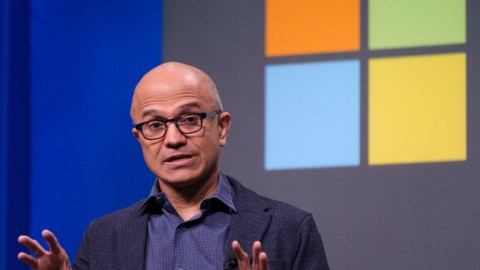Privacy is a human right, we need a GDPR for the world: Microsoft CEO

Microsoft CEO Satya Nadella answers a shareholders question during the Microsoft Annual Shareholders Meeting at the Meydenbauer Center on November 28, 2018 in Bellevue, Washington. Microsoft recently surpassed Apple, Inc. to become the world's most valuable publicly traded company. (Photo by Stephen Brashear/Getty Images)
Against the backdrop of a “techlash”, the CEO of Microsoft called for new global norms on privacy, data and Artificial Intelligence.
Satya Nadella, who has been shifting Microsoft’s focus to cloud computing, said he would welcome clearer regulations as every company and industry grappled with the data age.
In a talk at Davos, he praised GDPR, the European regulation on data protection and privacy that came into force last year.
“My own point of view is that it’s a fantastic start in treating privacy as a human right. I hope that in the United States we do something similar, and that the world converges on a common standard.”
The default position had to be that people owned their own data, he said.
Privacy is just one controversial area for tech companies. Nadella also addressed the growing field of facial recognition.
“It’s a piece of technology that’s going to be democratized, that’s going to be prevalent, I can come up with 10 uses that are very virtuous and important and can improve human life, and 10 uses that would cause problems,” he said.
Microsoft’s own website lists the below as applications to celebrate:
“Police in New Delhi recently trialed facial recognition technology and identified almost 3,000 missing children in four days. Historians in the United States have used the technology to identify the portraits of unknown soldiers in Civil War photographs taken in the 1860s. Researchers successfully used facial recognition software to diagnose a rare, genetic disease in Africans, Asians and Latin Americans.”
But the dark sides include invasion of privacy and bias. While Microsoft has built a set of principles for the ethical use of AI, Nadella said that self-regulation was not enough.
“In the marketplace there’s no discrimination between the right use and the wrong use… We welcome any regulation that helps the marketplace not be a race to the bottom.”
—
Reprinted with permission of World Economic Forum. Read the original article here.






